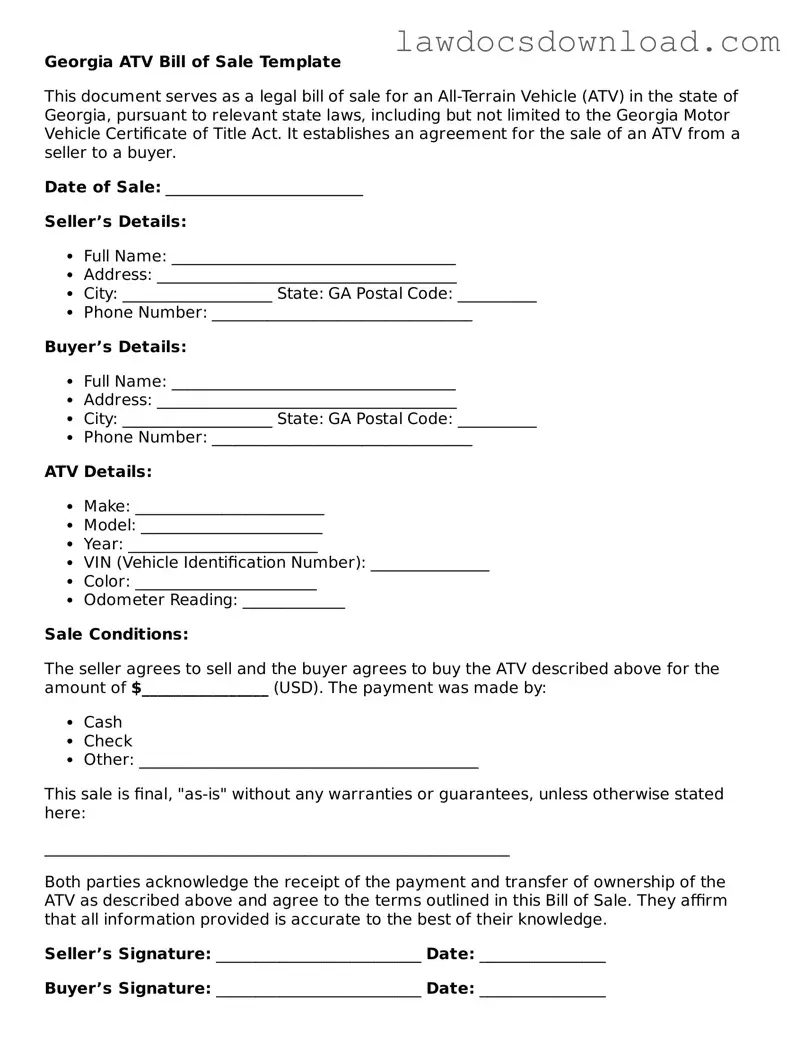The Georgia ATV Bill of Sale form shares similarities with the Vehicle Bill of Sale form, a critical document in the process of buying or selling an automobile. Both forms serve as legal proof of the transaction, detailing the parties involved, the date of sale, and specific information about the item sold (in one case, an all-terrain vehicle, and in the other, a vehicle). These documents are essential for the registration process, helping to establish the new owner's legal right to the item.
Similar to a Boat Bill of Sale form, the Georgia ATV Bill of Sale form is used to document the transfer of ownership of a specific item—in this instance, an ATV vs. a boat. Both forms capture vital transaction details such as the purchase price, description of the item, and both parties' signatures. They play a vital role in registering the item with the appropriate state department, ensuring that the transaction complies with state laws and regulations.
Another document that resembles the Georgia ATV Bill of Sale form is the Motorcycle Bill of Sale form. Both are utilized in transactions involving vehicles designed for specific terrains or purposes, with each form serving as a legal record that a sale and purchase occurred. They detail the make, model, and identification number of the vehicle, acting as a protective measure against potential disputes over ownership or fraud.
The Equipment Bill of Sale form is also akin to the Georgia ATV Bill of Sale form, as both are used in the sale of personal property. While one is specific to ATVs and similar vehicles, the equipment bill covers a broader range of items, from machinery to office equipment. Nonetheless, both documents establish proof of purchase and transfer of ownership, detailing the conditions of the sale and the agreement reached by both parties.
The Georgia ATV Bill of Sale form bears similarities to the Firearm Bill of Sale form. Although they cater to vastly different items, both forms are crucial for detailing the sale of regulated items. They include important information such as serial numbers and specific descriptions, and they ensure that the transaction adheres to state regulations. This documentation is fundamental for the buyer's legal possession and use of the item.
Alike the Georgia ATV Bill of Sale, the General Bill of Sale form is used to provide evidence of a transaction. The General Bill of Sale can apply to a wide variety of items, from furniture to electronics, making it more versatile than the ATV-specific form. Both forms, however, are pivotal in recording the details of the sale, including the parties' information, item description, and sale date, to protect both buyer and seller against future disputes.
The Livestock Bill of Sale form shares commonalities with the Georgia ATV Bill of Sale, as both document the sale of specific types of property. The former focuses on the sale of animals such as cattle, horses, and other livestock, capturing details about the animal and terms of the sale. Both forms serve as a legal record verifying the transfer of ownership and ensuring that all pertinent details of the transaction are agreed upon by both parties.
Lastly, the Real Estate Bill of Sale form, while dealing with transactions of a different nature—real estate as opposed to personal property like an ATV—shares the fundamental purpose of officially recording the sale and transfer of ownership. Both forms require detailed descriptions of the item being sold (a physical property in one, an ATV in the other), and they must be signed by both parties to confirm the agreement. These documents are essential for later registration and legal processes, underscoring the legitimacy of the transaction.

